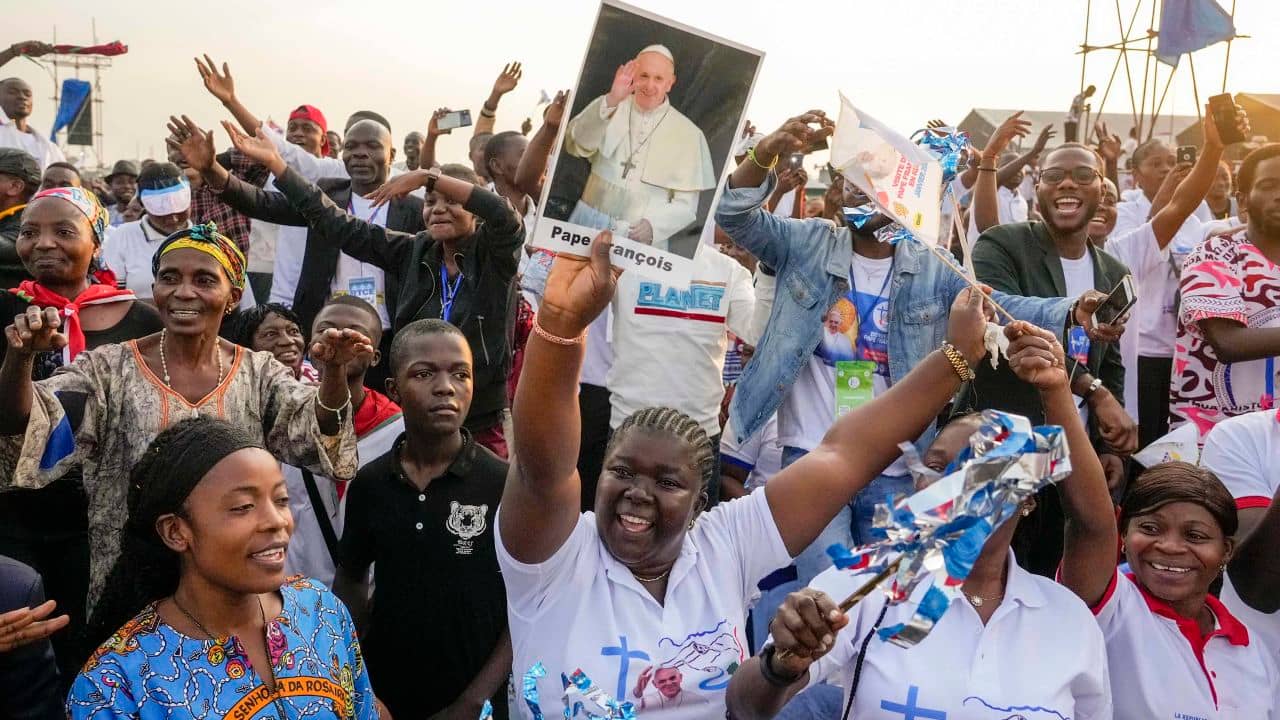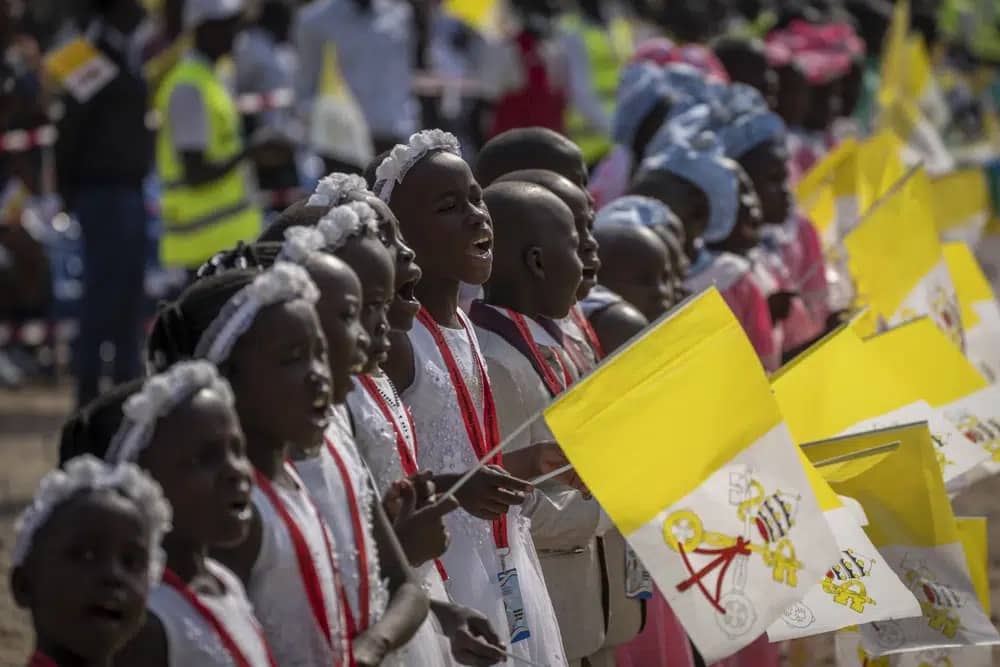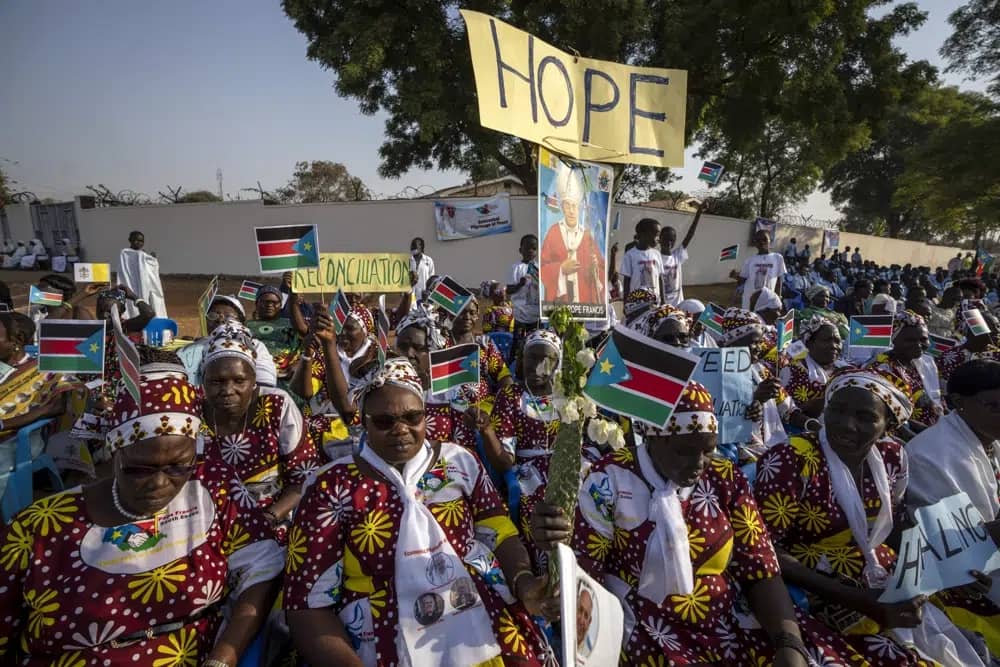YAOUNDÈ, Cameroon – While popes don’t have a magic wand, capable of making entrenched social problems disappear, Pope Francis’s mere presence in the troubled nation of South Sudan over the weekend nevertheless seemed to unleash a torrent of hope for change.
“No more guns,” an ululating woman shouted as crowds of people lined the streets to welcome Francis to Juba, the national capital.
“We need peace in this country,” came the chorus.
“Our pleasure [is] seeing the pope today in South Sudan. We pray for our leaders to change their minds. South Sudanese have suffered enough in the hands of their leaders,” said Williams Deng. who was watching the Pope’s arrival in Juba live from Bangladesh.
‘The leaders of South Sudan, please wake up, share public resources with the people and put an end to the lost years once and for all,” he said.
When South Sudan engaged in a war to gain independence from Sudan, it was cheered on by Western leaders. When independence finally came in 2011, shouts of freedom rang across the country.
But just two years later, the world’s newest country descended into chaos. Bitter rivalry between the Dinka and Nuer ethnic groups, symbolized by the tension between President Salva Kiir (a Dinka) and his Vice President Riek Machar (from the Nuer).
The war that broke out in 2013 has left an estimated 400,000 people dead and created what many experts regard as one of the world’s worst crises of internally displaced persons. Western powers that cheered the South Sudanese on in their war of independence have largely neglected the country afterwards, as South Sudan has been grappling with insecurity, drought, and hunger.
Father Samuel Abe, general coordinator for the papal visit to South Sudan, says the pope’s messaging could push the country beyond tribal conflict.
“Our late Archbishop Paulino used to say, ‘To have a tribe is not a problem’,” Abe said during a webinar ahead of Francis’ visit to South Sudan. The reference was to Archbishop Paulino Lukudu Loro, who led the Juba archdiocese for 35 years, from 1983 to 2019, and who died in 2021.
“You can speak about your tribe, but it has to be an expression that unites us with the other tribes,” Abe said. He said when South Sudan was still part of Sudan, tribal identity hadn’t become a political force.
Everything changed, he said, when South Sudan got its long-fought independence in 2011.
“When we were one Sudan, we were really very good people. We may all come from different tribes, but there is a unifying factor when we look at ourselves as black people. This issue of tribalism came out when we became independent and sometimes, we don’t know what exactly is causing it, but as a Church, we are speaking about the unity of the tribes.”
“The tribes themselves are not bad, because they are innocent people living in the villages and even those in the town, we came to discover that they are always supported and provoked to hate
“The moment our politicians will refrain from creating problems among the poor people in the villages, we will live like we used to before. We wish that the voice of the Church will be magnified and become louder by the visit of the Holy Father,” Abe said.
While in the country, Pope Francis hailed South Sudan’s history of collaboration among Christian communities as a remedy for tribalism.
“The ecclesial divisions of past centuries should not have any impact on those who are being evangelized, and the spread of the Gospel ought to contribute to the growth of greater unity,” he said, asking that “the tribalism and the partisan spirit that fuel acts of violence in this country not impair relationships between the various confessions.”
Describing Pope Francis’ arrival in South Sudan as “a historic milestone” for the country, President Salva Kiir said the visit “will leave a positive impact on our national conscience and peace in our country.”
Kiir said coming to South Sudan, together with the Archbishop of Canterbury Justin Welby and the Church of Scotland Moderator Iain Greenshields, “must compel us to engage in deep thinking about our reason in such history, especially on how it relates to the noble task of peace consolidation, and the important project of reconciliation and forgiveness among our people.”
The president recalled the 2019 retreat in Rome when Pope Francis dramatically kissed his feet and those of his archrival Mashar.
“That rare message in humility did not go in vain,” Kiir said. The two leaders came back from Rome and signed what is known as the Revitalized Peace Agreement, which should end in the organization of free, fair and transparent elections.
“We remain committed until peace is firmly consolidated in South Sudan,” the President said. But implementation has been slow, with the leaders extending the transitional period by 24 months.
Kiir told the Pope that the decision to extend it was guided by the desire for an inclusive political process in which every South Sudanese would find expression, and set up institutions that can manage “credible and transparent elections.”













